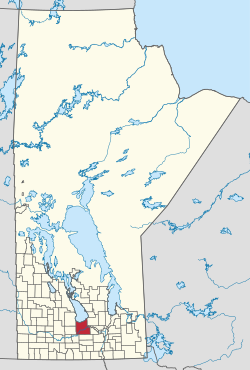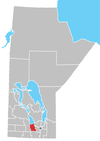Rural Municipality of Portage la Prairie
Appearance
Rural Municipality of Portage la Prairie | |
|---|---|
 Location of the RM of Portage la Prairie in Manitoba | |
| Coordinates: 50°02′56″N 98°12′58″W / 50.04889°N 98.21611°W | |
| Country | Canada |
| Province | Manitoba |
| Region | Central Plains |
| Area | |
| • Land | 1,961.97 km2 (757.52 sq mi) |
| Population | |
• Total | 6,975 |
| Time zone | UTC-6 (CST) |
| • Summer (DST) | UTC-5 (CDT) |
| Area codes | 204 and 431 |
Portage la Prairie is a rural municipality (RM) in the province of Manitoba in Western Canada. It surrounds the city of Portage la Prairie, Manitoba's fifth-largest city. Also within the borders of the municipality are the Dakota Plains First Nation and most of the Long Plain First Nation Indian reserves.
Communities
[edit]- Bloom
- Curtis
- Delta Beach
- Edwin
- Fortier
- Fulton
- High Bluff
- Layland
- Longburn
- Macdonald
- Newton
- Oakland
- Oakville
- Poplar Point
- Rignold
- St. Ambroise
- Southport
Demographics
[edit]In the 2021 Census of Population conducted by Statistics Canada, Portage la Prairie had a population of 6,888 living in 2,167 of its 2,456 total private dwellings, a change of -1.2% from its 2016 population of 6,975. With a land area of 1,973.45 km2 (761.95 sq mi), it had a population density of 3.5/km2 (9.0/sq mi) in 2021.[2]
| Panethnic group | 2021[3] | 2016[4] | 2011[5] | 2006[6] | 2001[7] | |||||
|---|---|---|---|---|---|---|---|---|---|---|
| Pop. | % | Pop. | % | Pop. | % | Pop. | % | Pop. | % | |
| European[a] | 4,255 | 78.51% | 4,410 | 77.57% | 4,405 | 81.88% | 5,780 | 85.06% | 6,005 | 88.44% |
| Indigenous | 1,045 | 19.28% | 1,165 | 20.49% | 840 | 15.61% | 1,000 | 14.72% | 730 | 10.75% |
| African | 40 | 0.74% | 50 | 0.88% | 0 | 0% | 10 | 0.15% | 0 | 0% |
| East Asian[b] | 25 | 0.46% | 40 | 0.7% | 65 | 1.21% | 20 | 0.29% | 35 | 0.52% |
| Southeast Asian[c] | 25 | 0.46% | 0 | 0% | 0 | 0% | 0 | 0% | 15 | 0.22% |
| South Asian | 20 | 0.37% | 25 | 0.44% | 0 | 0% | 0 | 0% | 0 | 0% |
| Middle Eastern[d] | 0 | 0% | 20 | 0.35% | 0 | 0% | 0 | 0% | 10 | 0.15% |
| Latin American | 0 | 0% | 10 | 0.18% | 25 | 0.46% | 0 | 0% | 0 | 0% |
| Other/multiracial[e] | 0 | 0% | 10 | 0.18% | 35 | 0.65% | 0 | 0% | 0 | 0% |
| Total responses | 5,420 | 78.69% | 5,685 | 81.51% | 5,380 | 82.45% | 6,795 | 100.03% | 6,790 | 99.99% |
| Total population | 6,888 | 100% | 6,975 | 100% | 6,525 | 100% | 6,793 | 100% | 6,791 | 100% |
| Note: Totals greater than 100% due to multiple origin responses | ||||||||||
Notes
[edit]- ^ Statistic includes all persons that did not make up part of a visible minority or an indigenous identity.
- ^ Statistic includes total responses of "Chinese", "Korean", and "Japanese" under visible minority section on census.
- ^ Statistic includes total responses of "Filipino" and "Southeast Asian" under visible minority section on census.
- ^ Statistic includes total responses of "West Asian" and "Arab" under visible minority section on census.
- ^ Statistic includes total responses of "Visible minority, n.i.e." and "Multiple visible minorities" under visible minority section on census.
References
[edit]- ^ a b "Population and dwelling counts, for Canada, provinces and territories, and census subdivisions (municipalities), 2016 and 2011 censuses – 100% data (Manitoba)". Statistics Canada. February 7, 2018. Retrieved January 15, 2022.
- ^ "Population and dwelling counts: Canada, provinces and territories, and census subdivisions (municipalities), Manitoba". Statistics Canada. February 9, 2022. Retrieved February 20, 2022.
- ^ Government of Canada, Statistics Canada (October 26, 2022). "Census Profile, 2021 Census of Population". www12.statcan.gc.ca. Retrieved June 2, 2024.
- ^ Government of Canada, Statistics Canada (October 27, 2021). "Census Profile, 2016 Census". www12.statcan.gc.ca. Retrieved June 2, 2024.
- ^ Government of Canada, Statistics Canada (November 27, 2015). "NHS Profile". www12.statcan.gc.ca. Retrieved June 2, 2024.
- ^ Government of Canada, Statistics Canada (August 20, 2019). "2006 Community Profiles". www12.statcan.gc.ca. Retrieved June 2, 2024.
- ^ Government of Canada, Statistics Canada (July 2, 2019). "2001 Community Profiles". www12.statcan.gc.ca. Retrieved June 2, 2024.
External links
[edit]

